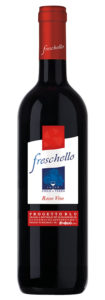Italian wine bottler Cielo e Terra and UPM Raflatac partnered to understand and reduce environmental impacts using lifecycle assessment. It provides valuable insight into the product’s value chain, revealing the lifecycle stages with the greatest environmental impact.

Kaisa Vainikka
Tracing impacts
This was the first-ever lifecycle assessment completed for any of Cielo e Terra’s products.
“The lifecycle assessment helps Cielo e Terra and its subcontractors analyse their processes and identify operations where environmental impact can be reduced,” says Kaisa Vainikka, Sustainability Manager at UPM Raflatac.
The analysis revealed that Freschello’s most significant environmental impact is caused by the process of manufacturing the glass bottles in which the wine is sold.
Another major impact was related to the winery’s energy consumption and chosen energy sources. Cielo e Terra sees environmental responsibility as a competitive advantage. The company is moving towards more sustainable production and has switched to using renewable energy at its facility.
These changes translate into direct improvements in the wine bottle’s lifecycle assessment.
“The lifecycle assessment can also be utilized in consumer communication to describe the product’s environmental impacts in detail,” adds Vainikka.
Recycling through RafCycle
For several years now, Cielo e Terra has been a member of UPM Raflatac’s RafCycle® recycling programme for label stock waste.
Release liners can for instance be used in the manufacturing of recycled paper. Other by-products of the label manufacturing process are used as raw material for UPM ProFi wood and plastic composite products, or for energy generation at UPM’s production plants. “Previously, these byproducts were incinerated or taken to landfills, but now they can be reused and recycled efficiently,” Vainikka says.

Thanks to RafCycle, Cielo e Terra has also managed to reduce its waste disposal fees. In addition, the efficient recycling programme strengthens the company’s brand image, which is a welcome advantage amid growing environmental awareness on the consumer market.
“The Freschello wine label will soon carry the RafCycle logo. This is a clear signal to consumers helping Cielo e Terra to clearly communicate its commitment to sustainability.”
Matti Remes
Read more
